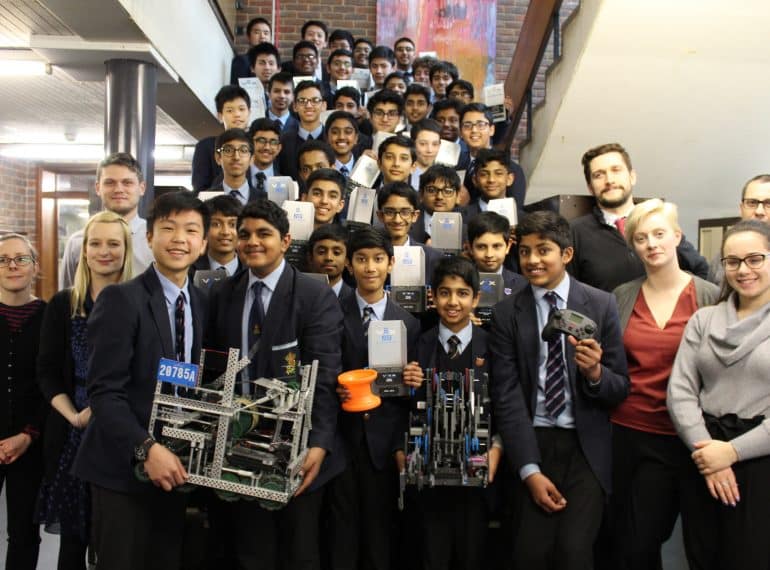
Having swept all before them at the UK national VEX Robotics finals, a record four junior teams set off for the world championships in Kentucky, together with a newly formed senior team.
And great as their achievement was in qualifying for the world championships, there were still greater triumphs to come, as the junior (IQ) teams picked up a string of awards, with one of them – Technogear – becoming the first-ever UK team to reach the Teamwork Challenge finals, held in the 20,000-seater Freedom Hall.
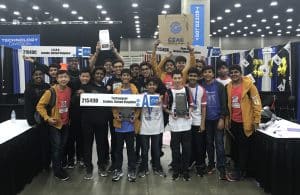 This year’s competitors were building on the success of 2018, when the awards won in Kentucky by QE included the first-ever world title – the Excellence Award – to be won by a UK school.
This year’s competitors were building on the success of 2018, when the awards won in Kentucky by QE included the first-ever world title – the Excellence Award – to be won by a UK school.
QE’s Head of Technology Michael Noonan, who accompanied the boys to the US this year, said afterwards: “Although Technogear narrowly missed out on an overall podium finish, this couldn’t detract from their high spirits, nor from the immense pride felt by mentors, VEX UK staff and members of other UK teams in their incredible achievement in winning their division and reaching the Teamwork Challenge finals.
“All the QE students felt that their experiences in Louisville, the Kentucky Exposition Center and the Freedom hall were once-in-a-lifetime,” added Mr Noonan, who had himself earlier been crowned Teacher of the Year at the VEX Robotics UK national finals in Telford. “Having paused to enjoy the rollercoasters and fun of the Kentucky Kingdom amusement park, they have already started planning for next year!”
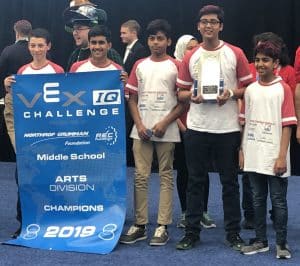 Mr Noonan also asked Technogear drivers Yash Shah and Anubhav Rathore how they felt while they were waiting for the final results to come in. “This is the best day of my life. I don’t care if we win or not; this experience alone has been incredible, and incredibly beats that of winning the Excellence Award last year!” said Yash, while Anubhav expressed similar sentiments: “It doesn’t really matter if we win or not. Just getting here, to meet all of these people from around the world and share our experiences and make new friendships, is reward enough.”
Mr Noonan also asked Technogear drivers Yash Shah and Anubhav Rathore how they felt while they were waiting for the final results to come in. “This is the best day of my life. I don’t care if we win or not; this experience alone has been incredible, and incredibly beats that of winning the Excellence Award last year!” said Yash, while Anubhav expressed similar sentiments: “It doesn’t really matter if we win or not. Just getting here, to meet all of these people from around the world and share our experiences and make new friendships, is reward enough.”
The QE teams’ path to Kentucky was confirmed after their barnstorming performances at the national finals in Telford in March. Eight teams (three from the senior EDR competition, for pupils in Years 10–13 and five IQ teams, for Years 5-9) competed: the EDR teams were APEX, Cobra and HYBRID; the IQ teams were Gearsquad, Hyperdrive, ECHO, Technogear and Supercharge.
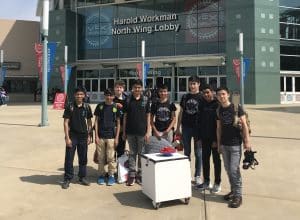 “After a tough first day, all three EDR teams were excellently placed for qualification, with HYBRID and APEX in particular in commanding positions,” said Mr Noonan. In the later stages, however, the EDR teams found the competition tough. Nevertheless, Team Cobra won the Innovate Award, when “their unusual ‘side-shooting’ design caught the judges’ eye”. It was HYBRID, however, who came away with the top prize – the overall Excellence Award. This, Mr Noonan said, was “for a terrific performance in all aspects of the competition, ranging from judging interviews and coding an efficient autonomous routine to overall performance in the teamwork championship”. This award sealed the team’s entry to the world championships for the second year running.
“After a tough first day, all three EDR teams were excellently placed for qualification, with HYBRID and APEX in particular in commanding positions,” said Mr Noonan. In the later stages, however, the EDR teams found the competition tough. Nevertheless, Team Cobra won the Innovate Award, when “their unusual ‘side-shooting’ design caught the judges’ eye”. It was HYBRID, however, who came away with the top prize – the overall Excellence Award. This, Mr Noonan said, was “for a terrific performance in all aspects of the competition, ranging from judging interviews and coding an efficient autonomous routine to overall performance in the teamwork championship”. This award sealed the team’s entry to the world championships for the second year running.
Starting a day later, the IQ competitors were spurred on by the success of their older Elizabethan counterparts. “There was an air of trepidation amongst the Queen Elizabeth’s IQ teams when they arrived at Telford, as the British season leading up to these finals had been highly competitive, and the teams had never found it as difficult to accrue regional awards. However, it was clear from the outset that the teams from Barnet were intent on changing that fact, with some of the highest scores of the day set right from the outset by Gearsquad (30, 28) and Supercharge (27).”
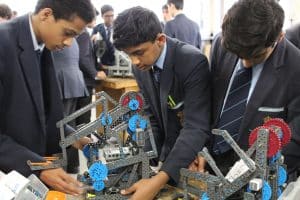 In the final rounds at Telford, “the greatest shock of the entire competition” occurred, when a pairing of QE’s ECHO with a team from Highgate School scored 38 points, thus setting a new UK record and equalling the current world record.
In the final rounds at Telford, “the greatest shock of the entire competition” occurred, when a pairing of QE’s ECHO with a team from Highgate School scored 38 points, thus setting a new UK record and equalling the current world record.
The last day ended in triumph for QE, with IQ teams from the School taking first, second and third places in the Teamwork competition and also winning the Skills championship. In addition: ECHO and Supercharge both won an Amaze Award; Gearsquad won the Build Award; Hyperdrive won the Judges Award, and Technogear took both the Sportsmanship and Design awards. Four IQ teams qualified for the world finals in Louisville – ECHO, Gearsquad, Supercharge and Technogear.
At EDR level, examination commitments meant that some of the HYBRID team were unable to make the trip to Kentucky, so boys from the APEX team were drafted in as replacements. “As if competing against 600 of the world’s finest teams (the equivalent of the top 1%) was not enough of a challenge, the prospect of forming a new team with just one month to go added to the overall difficulty,” said Mr Noonan.
On arrival in Louisville, after enjoying the ceremonial Parade of Nations, the new team threw themselves enthusiastically into the inter-team co-operation that is an important facet of VEX Robotics. “The students made their way to competition on the first day and began to strategise (sometimes in Mandarin and Spanish) with other teams from around the globe.”
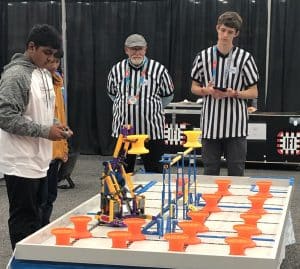 After a successful first day of practice, day two brought mixed fortunes – won 2, lost 2 – and day three brought a three-game losing streak after an initial victory. “To their immense credit, they rallied and recorded two excellent wins in their final two games, finishing with a 5-6 win:loss ratio. “The students were not despondent but proud of their efforts, especially when the judges bestowed the Service Award on the team, recognising their efforts both in mentoring younger teams in school and in the technology ‘Showcase.’ This represents the first award won by this school at EDR level in the World Championships.”
After a successful first day of practice, day two brought mixed fortunes – won 2, lost 2 – and day three brought a three-game losing streak after an initial victory. “To their immense credit, they rallied and recorded two excellent wins in their final two games, finishing with a 5-6 win:loss ratio. “The students were not despondent but proud of their efforts, especially when the judges bestowed the Service Award on the team, recognising their efforts both in mentoring younger teams in school and in the technology ‘Showcase.’ This represents the first award won by this school at EDR level in the World Championships.”
With its record contingent at IQ level, QE contributed to the general excitement felt among the UK teams. “Having attended the World Championships last year, Technogear were well placed to pass on their experience of the event to their less-experienced school mates, and an overall great air of co-operation was evident amongst the QE teams,” said Mr Noonan.
Initial results were patchy, with ECHO’s 30 points the highlight. On the second day, Gearsquad battled through some tough fixtures before combining with girls from The Henrietta Barnett School to finish the day with “a fantastic 38”. Mr Noonan said: “As day two closed, the QE teams were ranked in or around the top 20, with the exception of Technogear, who were temporarily languishing at 59th.”
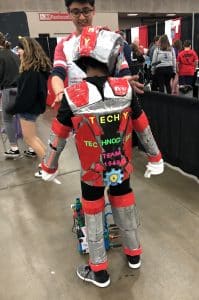 Day three saw Technogear bounce back in style: “Paired with Dragon Tech. from California (an early favourite for world glory), they equalled the world record with a seismic 41 points!” – a performance that led to their ranking instantly soaring to 15th. “No doubt inspired by their actions, all the other QE teams opened in similarly strong fashion.”
Day three saw Technogear bounce back in style: “Paired with Dragon Tech. from California (an early favourite for world glory), they equalled the world record with a seismic 41 points!” – a performance that led to their ranking instantly soaring to 15th. “No doubt inspired by their actions, all the other QE teams opened in similarly strong fashion.”
From that position, all the QE teams could theoretically have gone on to qualify for the final stages, but for ECHO, Gearsquad and Supercharge, it was not to be, although ECHO were able to take solace in an extremely strong season which left them ranked as the world’s 19th highest team for skills.
Paired once again with Dragon Tech., Technogear continued to score highly. In the middle match of the divisional final, their 40-point tally proved decisive. “The nervous wait watching the remaining final games of the division proved difficult for Technogear and the Queen Elizabeth’s teams, but ultimately their score stood, and they were crowned champions of the Arts Division: they were heading to the World Teamwork Finals in the 20,000 seater-Freedom Hall and a worldwide audience of many thousands on the livestream!”
Once in this daunting arena, where the huge audience included the other QE teams and staff, “the cool and collected demeanour” of both Technogear and their Californian allies was impressive, Mr Noonan reported. They were, he said, perhaps unfortunate to score only 33 after a valiant battle on the competition floor. “This left QE in 3rd place, and with a chance of the podium, but ultimately the final two would outscore them, leaving Technogear in fifth place.”
 Technogear not only won a Champions Trophy for winning their division, but also took an Innovate Award. Supercharge picked up the Build Award for their division, while Gearsquad picked up the Sportsmanship Award. This was just reward for Gearsquad’s “fantastic attitude”, Mr Noonan reported – an attitude reflected in the comments of Gearsquad team member Darren Lee: “We said that we’d congratulate our drivers and our partners’ drivers after every game, regardless of whether we set a world record or had a tough score to take, and that proved to be the best part of the experience.”
Technogear not only won a Champions Trophy for winning their division, but also took an Innovate Award. Supercharge picked up the Build Award for their division, while Gearsquad picked up the Sportsmanship Award. This was just reward for Gearsquad’s “fantastic attitude”, Mr Noonan reported – an attitude reflected in the comments of Gearsquad team member Darren Lee: “We said that we’d congratulate our drivers and our partners’ drivers after every game, regardless of whether we set a world record or had a tough score to take, and that proved to be the best part of the experience.”
During the trip, the QE boys took the opportunity to see attractions including the picturesque Waterfront Park, the Muhammad Ali Museum and the Louisville Slugger baseball bat factory, while also enjoying the spectacle of a baseball game between the local Louisville Bats and the Durham Bulls.
- The EDR teams at the national finals were:
- APEX – Nirmay Jadhav, Swattik Das, Ansh Jaiswal, Siddh Patel, George Sewell and Lucas Lu, all from Year 10
- Cobra – Jimmy Ou, Leo Yang, Akram Ahmad and Mahdi Dhirani, all from Year 12
- HYBRID – Dillan Shah, of Year 10; Alex Woodcock, of Year 10; Kayan Intwala, of Year 10; Deshraam Ganeshamoorthy, of Year 11; James Tan, of Year 11; Daniel Radzik-Rahman, of Year 11, and Devin Karia, of Year 11.
- The IQ teams were:
- Gearsquad – Niyam Shah, Jai Akilesh Kaza Venkata, Darren Lee, Nathan Woodcock and Dipesh Dhavala, all from Year 8
- Hyperdrive – Shivam Singh, Aadarsh Aggarwal, Ashish Yeruva, Aarush Verma, Vedant Shah, Maxwell Johnson and Varun Srirambhatla, all from Year 8
- ECHO – Heemy Kalam, Bhunit Santhiramouselan, Indy Potluri, Akhil Walia and Abhiraj Singh, all from Year 9
- Technogear – Dylan Domb, Yash Shah, Anubhav Rathore, Ashwin Sridhar and Anish Rana, all from Year 9
- Supercharge – Arya Bhatt, Pranav Chawla, Raghav Rajaganesh, Chakshu Chopra, Frank Zhang, all from Year 9.

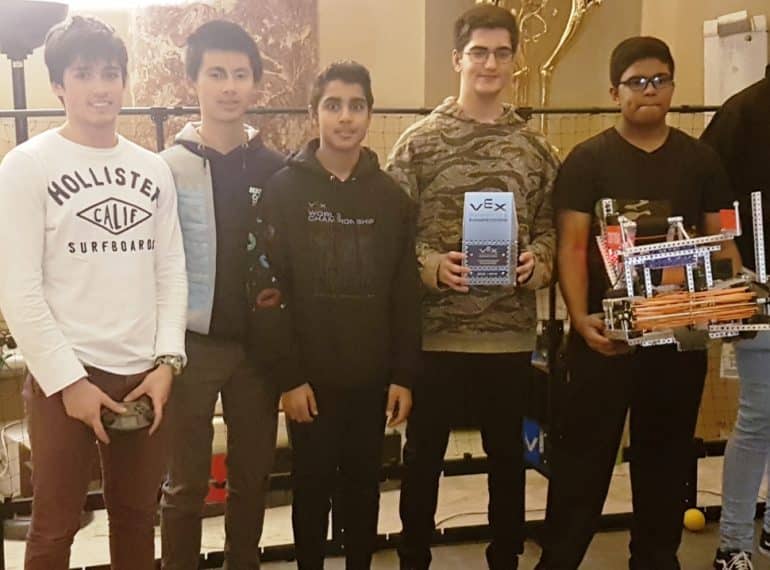
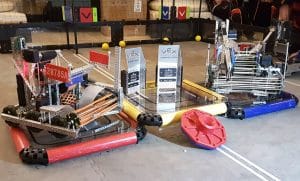 The teams are aiming to build on the School’s success last year, when QE junior boys competing in the parallel VEX IQ competition not only reached the World Championships in the USA but were crowned the UK’s first-ever world champions. A VEX EDR team from QE also qualified for the World Championships, where they achieved the best-ever result for a UK team.
The teams are aiming to build on the School’s success last year, when QE junior boys competing in the parallel VEX IQ competition not only reached the World Championships in the USA but were crowned the UK’s first-ever world champions. A VEX EDR team from QE also qualified for the World Championships, where they achieved the best-ever result for a UK team.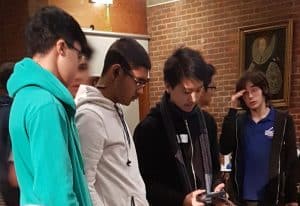 Cobra, a new team comprising Year 12 boys competing in their first-ever VEX EDR event, have also qualified for the nationals, which take place in Telford in March. They performed strongly throughout the round held at St Olave’s Grammar School in Orpington, where they finished third in the Skills Challenge. And in the next round, at The Henrietta Barnett School, they successfully reached both the knockout stage and the final, where they lost by a mere three points.
Cobra, a new team comprising Year 12 boys competing in their first-ever VEX EDR event, have also qualified for the nationals, which take place in Telford in March. They performed strongly throughout the round held at St Olave’s Grammar School in Orpington, where they finished third in the Skills Challenge. And in the next round, at The Henrietta Barnett School, they successfully reached both the knockout stage and the final, where they lost by a mere three points.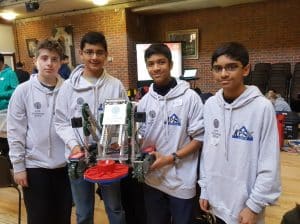 lost out to the team which went on to win the round. Apex also performed strongly at HBS: like Cobra, they reached the knockout stages, where once again they were eliminated by the eventual overall winners.
lost out to the team which went on to win the round. Apex also performed strongly at HBS: like Cobra, they reached the knockout stages, where once again they were eliminated by the eventual overall winners.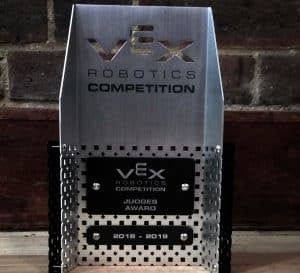 s are required to collaborate, as well as compete against others.
s are required to collaborate, as well as compete against others.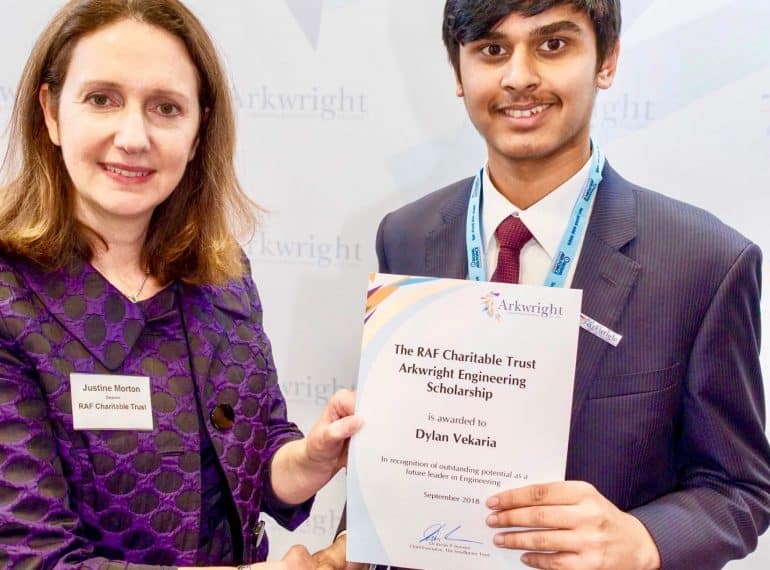
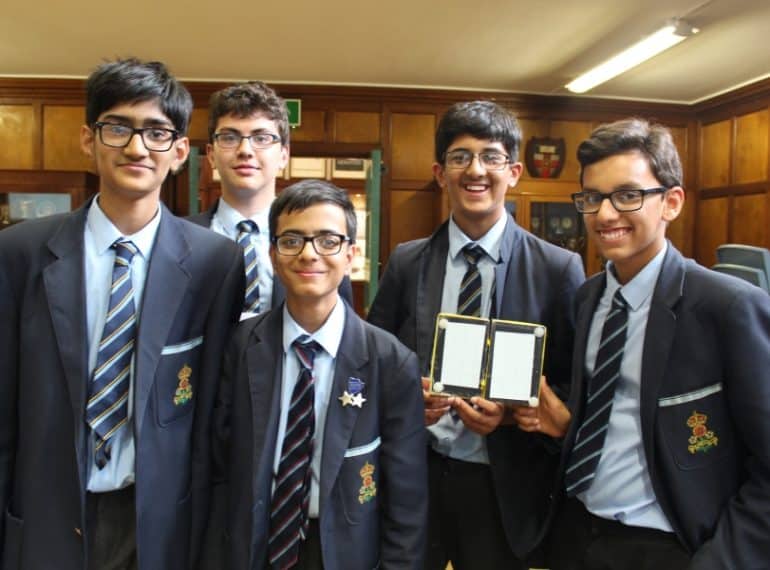
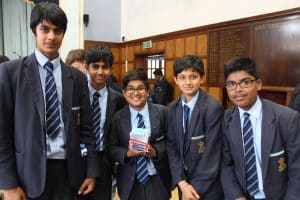 They had to design a product to solve a real-world problem, while also considering their marketing and business proposition. To create their prototypes, the participants were allocated a budget which they could use to buy the basic materials (such as card, tape and wooden sticks) from a ‘market’ in the hall.
They had to design a product to solve a real-world problem, while also considering their marketing and business proposition. To create their prototypes, the participants were allocated a budget which they could use to buy the basic materials (such as card, tape and wooden sticks) from a ‘market’ in the hall.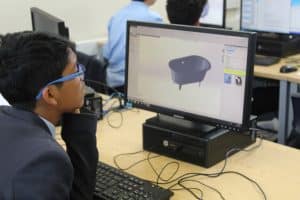 finance and business acumen to come up with a new product that was a practical proposition – and all in the space of a day. The boys successfully produced some very interesting and promising proposals.”
finance and business acumen to come up with a new product that was a practical proposition – and all in the space of a day. The boys successfully produced some very interesting and promising proposals.”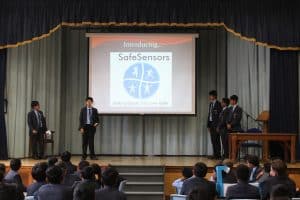 Afterwards, Simon said: “The students were given the opportunity to design and develop ideas that use some new, cutting-edge technologies. I talked through a few new materials and the associated technology – and the students did the rest. They came up with a wide range of new product ideas, with the best being presented in the Dragons’ Den.”
Afterwards, Simon said: “The students were given the opportunity to design and develop ideas that use some new, cutting-edge technologies. I talked through a few new materials and the associated technology – and the students did the rest. They came up with a wide range of new product ideas, with the best being presented in the Dragons’ Den.”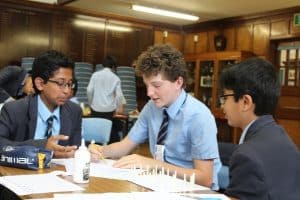 to charge a mobile phone. The second-day winners designed Simon’s particular favourite – SafeSensors, a sports helmet which not only protected the head but also had built-in impact sensors that could notify the team coach or doctor of any impact that would require a player to be treated or substituted (in cases of concussion, for example).
to charge a mobile phone. The second-day winners designed Simon’s particular favourite – SafeSensors, a sports helmet which not only protected the head but also had built-in impact sensors that could notify the team coach or doctor of any impact that would require a player to be treated or substituted (in cases of concussion, for example).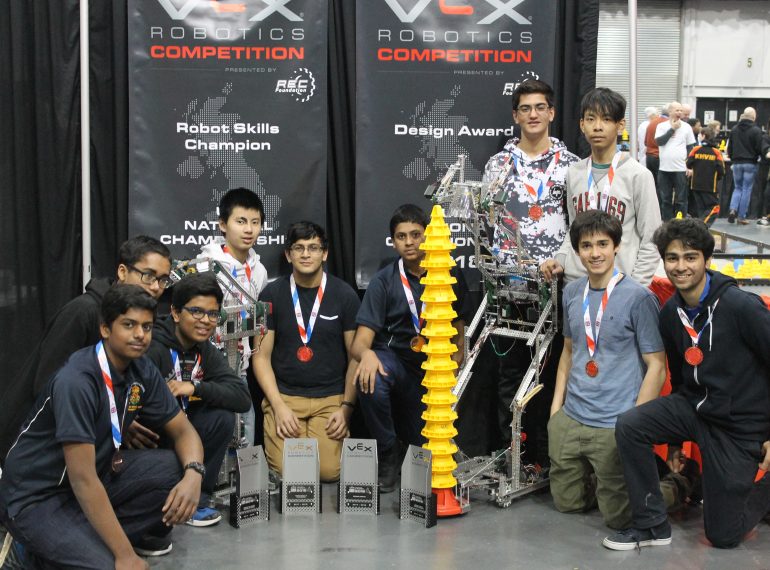
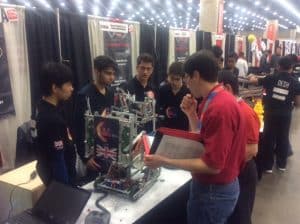 The VEX EDR World Championships, which is open to pupils from Years 10–13 (or ‘high school’, in American parlance), bring together 600 élite teams from around the world, pitting against each other national champions from 46 different countries, as well as state champions from around the US.
The VEX EDR World Championships, which is open to pupils from Years 10–13 (or ‘high school’, in American parlance), bring together 600 élite teams from around the world, pitting against each other national champions from 46 different countries, as well as state champions from around the US.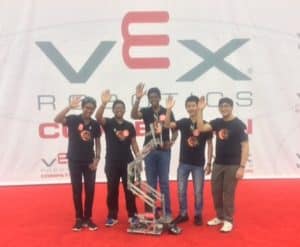 Alpha were paired for this match with a team from Rolling Hills, California. “Hybrid’s efforts were valiant, but excellent defence from the Chinese and Canadian combination saw their opponents win by a narrow margin of 115-92.”
Alpha were paired for this match with a team from Rolling Hills, California. “Hybrid’s efforts were valiant, but excellent defence from the Chinese and Canadian combination saw their opponents win by a narrow margin of 115-92.”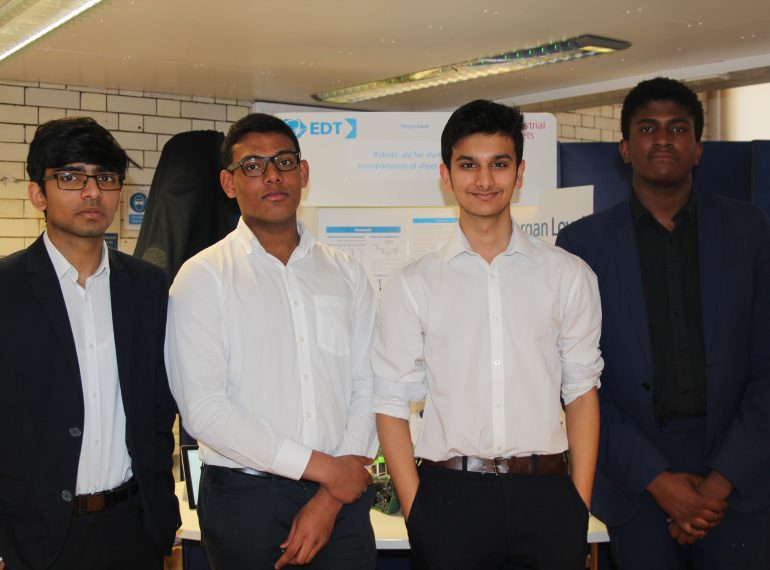
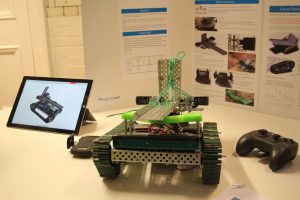 The project was Highly Commended in the Contribution to the Business Award at the Celebration and Assessment Day of the Engineering Excellence Scheme (EES).
The project was Highly Commended in the Contribution to the Business Award at the Celebration and Assessment Day of the Engineering Excellence Scheme (EES).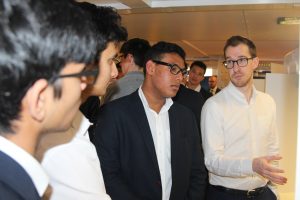 QE teamed up with construction company Morgan Lovell: Alex Woods, the firm’s Health and Safety Manager, and Delores Salgado, a Health and Safety Executive, served as mentors and provided the QE boys with a real-world engineering problem for them to resolve during the six-month project. Nathan Aderogba, Pranavan Gunaseelan, Chaitra Kawathekar and Kayman Krishnamohan were tasked with designing and testing a prototype that could autonomously or semi-autonomously lift large materials up flights of stairs.
QE teamed up with construction company Morgan Lovell: Alex Woods, the firm’s Health and Safety Manager, and Delores Salgado, a Health and Safety Executive, served as mentors and provided the QE boys with a real-world engineering problem for them to resolve during the six-month project. Nathan Aderogba, Pranavan Gunaseelan, Chaitra Kawathekar and Kayman Krishnamohan were tasked with designing and testing a prototype that could autonomously or semi-autonomously lift large materials up flights of stairs.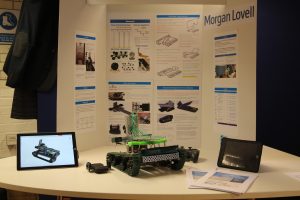 Based on the results of this research, the boys held a brainstorming process in which several ideas were examined and then rejected, before they eventually chose and developed a design which involved sheets being clamped on to a carrying tray located on a turntable. This allowed sheets to be carried vertically, for narrower spaces, but also horizontally, giving greater stability. It used rubber caterpillar tracks, which not only provide good grip but also avoid damage to floors. The boys used kit robotics components from VEX Robotics. None had had previous experience of either programming or robotics.
Based on the results of this research, the boys held a brainstorming process in which several ideas were examined and then rejected, before they eventually chose and developed a design which involved sheets being clamped on to a carrying tray located on a turntable. This allowed sheets to be carried vertically, for narrower spaces, but also horizontally, giving greater stability. It used rubber caterpillar tracks, which not only provide good grip but also avoid damage to floors. The boys used kit robotics components from VEX Robotics. None had had previous experience of either programming or robotics.